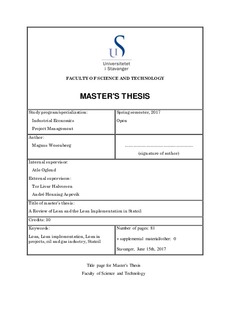| dc.contributor.author | Wesenberg, Magnus | |
| dc.date.accessioned | 2017-09-22T13:07:16Z | |
| dc.date.available | 2017-09-22T13:07:16Z | |
| dc.date.issued | 2017-06-15 | |
| dc.identifier.uri | http://hdl.handle.net/11250/2456328 | |
| dc.description | Master's thesis in Industrial economics | nb_NO |
| dc.description.abstract | The oil and gas industry is in a situation where changes are required to remain
competitive. Lean has proven to be a successful mean to improve companies worldwide,
which is why there has been a growing interest in Lean among the oil and gas companies
in the past few years. The corporate management in Statoil decided to use Lean as a way
of working to reach the goal of a continuous improvement culture.
This thesis provides a detailed literature study on Lean. The literature study
includes historic background of Lean, Lean principles, Lean tools, and a presentation of
Lean implementation with some potential challenges. This can be found in section 2.1.
Lean has traditionally been applied to typical, repetitive production systems, while this
thesis focus on how Lean can be used in other contexts. How Lean has been used in
projects and project management is the example which is presented in this thesis in
section 2.2. The presentation of Lean in projects is done through comparison of
traditional project management and Lean project management, where a few examples
have been included to illustrate the effects of Lean. The last part of the literature study
presents a brief overview of oil and gas industry, which can be found in section 2.3. This
part is included as a courtesy to the reader to get a better understanding of the industry,
which is useful further in the thesis.
The objective of the thesis is to discuss the Lean implementation process in Statoil,
as well as how Lean can be used as a way of working in the company. The discussion is
conducted in chapter 4. Through interviews and the literature study, issues have been
addresses such as limitations and challenges. An extra focus has been on discussing
Statoil’s relation with contractors. Potential improvement areas have also been
identified, along with how Lean tools can be used in Statoil. The Lean implementation
process has been thoroughly reviewed, addressing both advantages and disadvantages.
Furthermore, the new roadmap for digitalization in Statoil have been put in the context
of Lean.
Maintaining a focus on Lean in Statoil along with a continuous improvement culture
is the final topic discussed in this thesis, along with how Lean can assist Statoil in
preparing for the future. | nb_NO |
| dc.language.iso | eng | nb_NO |
| dc.publisher | University of Stavanger, Norway | nb_NO |
| dc.relation.ispartofseries | Masteroppgave/UIS-TN-IØRP/2017; | |
| dc.rights | Navngivelse 4.0 Internasjonal | * |
| dc.rights.uri | http://creativecommons.org/licenses/by/4.0/deed.no | * |
| dc.subject | industrial economics | nb_NO |
| dc.subject | oil and gas industry | nb_NO |
| dc.subject | Statoil | nb_NO |
| dc.subject | industriell økonomi | nb_NO |
| dc.subject | lean | nb_NO |
| dc.subject | lean implementation | nb_NO |
| dc.subject | prosjektledelse | nb_NO |
| dc.title | A Review of Lean and the Lean Implementation in Statoil | nb_NO |
| dc.type | Master thesis | nb_NO |
| dc.subject.nsi | VDP::Samfunnsvitenskap: 200::Økonomi: 210 | nb_NO |

